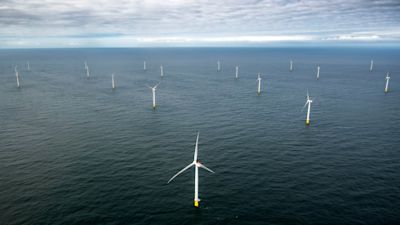Major blow for renewable energy industry as Vattenfall halts plans for Norfolk Boreas wind farm

An energy company has stopped development on a major wind farm off the East coast, blaming rising costs for halting a project which would have powered 1.5 million homes.
The decision, announced in the Swedish firm's Vattenfall's quarterly results, comes at a cost of £415m and has prompted questions from unions about the future of similar projects elsewhere in the UK.
Vattenfall said a rise in costs of 40% had made the project unaffordable at the moment.
The 1.4-gigawatt Boreas project was due to be the first of three Vattenfall projects off the Norfolk coast - to be followed by Norfolk Vanguard East and West - whose future is also being considered by the company.
Construction on Boreas had not yet started and the company's website said that discussions with the supply chain were due to begin in 2023. Onshore infrastructure work for the Vanguard projects would continue, said the firm.
“Offshore wind is essential for affordable, secure and clean electricity, and it is a key element of Vattenfall’s strategy for fossil-free living,” said Vattenfall chief executive Anna Borg.
“But conditions are extremely challenging across the whole industry right now, with a supply chain squeeze, increasing prices and cost of capital, and fiscal frameworks not reflecting current market realities.
“Vattenfall believes in the strong fundamentals and rationale for the Norfolk projects.
“However, considering market conditions today, we are stopping the current development track for Norfolk Boreas and evaluating the best way forward for all three projects in the Norfolk Zone.”
The company added in the report: "Higher inflation and capital costs are affecting the entire energy sector, but the geopolitical situation has made offshore wind and its supply chain particularly vulnerable.”
Vattenfall's plans had been a major part of the government's ambition to more than triple offshore wind capacity by 2030 — from about 14GW to 50GW — to help decarbonise the UK's electricity system.
Why is Vattenfall halting the project?
For much of the past decade, offshore wind farms have been promised a fixed price for the electricity they produce through a so-called contract for difference (CfD).
This means that if electricity prices are below the promised price – known in industry jargon as the strike price – then companies get a subsidy to make up the difference.
Equally, if prices rise above that level then they have to pay back their additional gains.
Last year Vattenfall won one of these contracts to build the Norfolk Boreas wind farm at a joint record-low strike price of £37.35 per megawatt hour.
But since winning the auction, Vattenfall and others have warned that costs have increased far too fast for these projects to be economical anymore.
In March, Denmark’s Orsted warned that it might pause the Hornsea 3 project in the UK – expected to be the world’s largest wind farm when it opens – unless it gets help with surging costs. Hornsea 3 has the same £37.35 per MWh strike price as Norfolk Boreas.
Unions have called for greater support to be offered by government to prevent other energy firms scrapping major projects.
Sue Ferns, senior deputy general secretary of Prospect, said: "This decision is a serious blow to the UK’s clean energy rollout.
"It must be a wakeup call to government that current mechanisms for supporting renewables projects are not fit for purpose in a world of high interest rates and supply chain pressures.
"As the US and EU become increasingly attractive destinations for green investment, the UK is suffering from a race to the bottom on costs that is now preventing renewables projects being built.
"The government must urgently get a grip on problems in the Contracts for Difference process to put our net zero and energy security goals back on track and give certainty to workers across the sector."
Want a quick and expert briefing on the biggest news stories? Listen to our latest podcasts to find out What You Need To Know